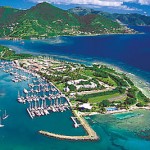The deep freeze – how are the Russia and Ukraine sanctions affecting offshore law firms?

With the impact of EU and US sanctions on Russia and Ukraine stretching far beyond the individuals targeted, Caroline Thorpe examines the effect on offshore jurisdictions, and how law firms are dealing with the pitfalls and opportunities of this high-risk environment
Risk, uncertainty and more than a whiff of political sensitivities – hardly the stuff of lawyers’ dreams. Yet they are today’s reality for those whose clients find themselves affected by recent geopolitical events in Ukraine and Russia.
The reach of European Union and US sanctions – imposed on around 80 individuals and one bank in Russia and Ukraine so far following Moscow’s annexation of Crimea in March – extends way beyond their named targets. Individuals, corporations, trusts and financial institutions worldwide are among those affected by the sanctions, which freeze the assets of the ‘designated persons’ listed and ban others from returning them, or from making funds or economic resources available to those blacklisted. As international financial centres, offshore jurisdictions are far from exempt. And some are potentially exposed to the effect of the sanctions more than others: Cyprus and the British Virgin Islands (BVI) were the first and third largest foreign direct investors in Russia in 2012, according to the International Monetary Fund. Cyprus also topped the table for Ukrainian foreign direct investment (FDI), with the BVI following in 11th place (see below).
Such links have seen lawyers – both on and offshore – meticulously keeping pace with policymakers’ pronouncements to ensure their clients don’t find themselves in breach of complex and frequently changing rules. So how are users of these offshore jurisdictions affected – and what are their legal advisers doing about it?
Their first task appears to be making friends with 24-hour news. The shifting situation on the ground in Ukraine has led to a run of policy announcements and amendments that lawyers must digest and communicate to their clients in the first instance (see timeline, below). As well as advisers in Cyprus and BVI informing themselves of EU sanctions – which they must follow due to these jurisdictions’ EU membership and status as a British dependency respectively – they must also look at the regulations coming out of the US Treasury department in Washington. The latter will have a particular impact on funds moving to or from offshore centres to Russia or Ukraine via US financial institutions.
For now, both the EU and US have opted for list-based sanctions, as opposed to country or sector-based varieties (although the US has laid the legal groundwork for some of the latter). List-based sanctions are designed to target specific individuals and institutions rather than entire populations or groups. “The sanctions are relatively targeted at present,” notes Louise Lamb, a litigation partner with sanctions expertise in Hogan Lovells’ London office.
While they may not apply blanket coverage to nations or specific industries, the EU’s sanctions still have “extremely wide territorial scope” reckons Harney Westwood & Riegels partner Aki Corsoni-Husain, who is based in Cyprus. For example, he explains, when applied to the UK’s overseas territories they affect any person or institution based or domiciled in the territory, as well as any citizen of the UK or those territories based anywhere in the world.
Similarly, America’s sanctions make it the duty of “every US person, company, entity or the like who comes into contact with anyone’s assets who [is listed as a designated person]… to block them and prevent the assets from being returned to that person”, Ropes & Gray partner Zachary Brez told the audience of a recent webinar on the impact of sanctions on international finance centres.
Measuring the impact
In practice firms have reported some slowing of work, such as advising on corporate activity with Russian and Ukrainian entities, while at the same time advice to clients on sanction compliance is picking up. Andrew Coddington, a partner in the BVI office of Forbes Hare, is among those noting a change in deal flow. “People are very much playing a wait and see game,” he says. “I was in Moscow the other week; a lot of deals that people were talking about towards the end of last year have been put on the backburner because they are waiting to see what the end game is in terms of Ukraine. People are more worried by political risk than they are by fiscal risk.”
He adds that small to medium-sized deals of up to $100m (£59.8m) are still happening, though tend to be relatively straightforward. “Most of what we’re seeing at the moment is Russian banks working through offshore structures where there is a Russian entity at the end of that chain,” he explains. “There is no complicated financial vehicle in the US, for example, it is [nearly] all Russia-to-Russia with an offshore element.
“The more high-profile transactions are taking an awful lot longer. I was supposed to be doing… a large restructuring but that has been put on hold until later in the year. It is really a question at the moment of political risk.”
Conversely, it is the element of risk associated with the various sanction regimes that is fuelling the increase in compliance work, primarily on the non-contentious side. Corsoni-Husain says that in BVI and Cyprus a major focus is on helping financial services companies assess their exposure to sanctioned individuals and, where necessary, helping them “placate risks they encounter from the situation as efficiently as possible”.
“Typically our clients are not the designated person themselves,” he says. “They tend to be the banks, registered agents, fiduciaries or brokers.” Such clients can seek a licence from the governing authority, which exempts an asset or entity from sanction – “if there are good reasons”, explains Corsoni-Husain.
For example, he says: “If you’re the asset manager of a sovereign wealth fund that is caught by the sanctions you can’t manage the fund without a licence. If you’re invested in a particular asset class that is not performing well that you would like to pull out of… there is a risk the value of the asset could be significantly prejudiced by the freeze. The idea is that the licence would allow management to carry out day-to-day activities, but it would not allow the fund to be wound up and the funds moved to another country where sanctions do not apply as that would defeat the purpose of the freeze.”
Working out whether or not a client is affected by a connection to a blacklisted individual, and how, can prove difficult. The complexity of some offshore structures can make it tricky to identify who ultimately sits behind them – and what their connection to a designated person might be. “It’s not always easy,” admits Lamb. “It can take a bit of digging. There will be some very transparent structures and some very complex structures.”
And there are limits, according to a corporate partner based in BVI. “The world’s gone so crazy on ‘know your client’,” he argues. “When do you stop tracking it? You can only go up to the ultimate beneficial owner. But, for example, if you appear [in records] as a shareholder or a large organisation, how do I know you don’t have a declaration of trust in favour of an oligarch, especially sitting offshore?”
Herbert Smith Freehills partner Susannah Cogman, speaking alongside Brez at the recent webinar, said corporate structures where a designated person had an interest but no overall control were an example of “where perhaps the [EU] regulations are not a model of clarity”.
“One would need to look quite clearly at the individual structure and try to understand what exactly the involvement of the designated person is, whether the transaction could lead to any funds or resources flowing to them and indeed whether the underlying assets are frozen because of their ownership or control.”
Rule breakers beware
Being found to be in breach of sanctions has serious consequences, particularly in the US where doing so is a strict liability offence. “‘No knowledge’ is not an absolute defence,” says Aleksandar Dukic, a partner at Hogan Lovells in Washington DC. “Regulators will expect you to take reasonable steps and know who you are dealing with. You can’t simply say ‘I haven’t looked behind the company in the BVI’. That is not going to get you far.”
In contrast, says Lamb, under EU law “the general rule is that a breach of sanctions isn’t a strict liability offence”. It is, though, a criminal one. “There are various defences open to you, in particular where you can show that you had no knowledge or ‘reasonable grounds to suspect’ that your actions were prohibited,” adds Lamb.
Nonetheless, sanctions remain a risky business – including for law firms themselves. Several of those contacted by Legal Week for this article, onshore and off, declined to comment citing political sensitivities. Litigation partner Lisa Springdale explains how at her firm, Bedell Cristin in Jersey, reputational risk is carefully weighed when considering taking on client matters relating to sanctions.
“From a local perspective, it is apparent that sanctions have shot up the scale of risks prioritised by offshore jurisdictions and thereby present challenges for Jersey, which is renowned for having a robust and highly regarded regulatory regime,” she says. “These challenges are faced locally not only by financial institutions, including trust and corporate service provider businesses involved in the administration of the structures in question, but also by the law firms that are advising on the same.”
Springdale adds that accurate assessment of the risks inherent in taking on such work “requires an extensive and in-depth analysis of the structures in question”. And that is expensive, particularly in matters spread across several jurisdictions. As a result, Bedell Cristin now charges ‘take-on fees’ in sanctions cases, with rates determined on “a case-by-case basis”.
“It is imperative though that these extensive take-on checks are undertaken to protect and preserve the reputation and integrity of the law firm, trust and corporate service provider – and thereby the island itself,” concludes Springdale.
Others in the offshore world are more sanguine. “The largest risk is [for firms] in Cyprus because they deal directly with the high-net-worth Russians and Ukrainians and they maintain those relationships,” says Forbes Hare partner Jose Santos. “We take instructions from intermediaries such as service providers or other law firms.”
His colleague Coddington adds the belief that Forbes Hare – which opened its first office in 2005 – benefits from being a “younger firm than most of our competitors. We don’t have the direct relationships and that eases our due diligence in respect of the sanctions.
“We obviously do all the ‘know your client’ procedures that we are required to do. When the sanctions lists came out we went through our records to make sure we don’t have a direct relationship with anybody listed.”
Meanwhile, Harneys’ Corsoni-Husain (pictured, above) sees “no reason why, subject to our usual checks and due diligence, Harneys wouldn’t advise a designated person on his or her rights and obligations under the sanctions regime. At the end of the day everyone has the right to legal representation.”
He argues that sanctions work “is definitely a practice area that is here to stay. It is likely that the situation in Russia and Ukraine will remain unstable for the foreseeable future and sanctions take a very long time to disappear, even after there is political agreement.”
Springdale concurs: “The rise in the number of sanctions being imposed worldwide will, without doubt, result in an increase in the level of instructions for law firms specialising in this area.”
Another certainty is that advisers will remain glued to events in Ukraine to see whether or not events prompt a further round of sanctions. As Coddington puts it: “Having spoken to a wide range of people during my visit to Moscow, the overriding theme is ‘wait and see’. It is all very Asquith 1913-14.”
Author: Caroline Thorpe
Source: legalweek





























